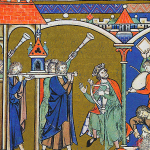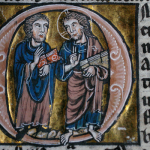“Faith in ‘progress’–in the lower spheres of intelligence appears as ascending life; but this is self-deception; in the higher spheres of intelligence as descending life.
“Description of the symptoms.
“Unity of point of view: uncertainty about standards of value.
“Fear of a general ‘in vain.’
“Nihilism.”
—Will to Power
OK, WTP is basically Nietzsche’s notes, so it’s often hard to tell precisely what he was getting at, and this snippet is no exception. But given the other things he’s been saying in this section, here’s what I think this note means: The belief in “progress”–in history as a slow but unstoppable movement toward some good goal–is a symptom of the decay of belief in particular standards of value (e.g. religion). People no longer have a fixed standard of value by which they can judge life (and this is good–Nietzsche believes that to judge life according to some outside standard is necessarily to condemn life; that’s why modern science gets grouped with other forms of “asceticism” in the Genealogy of Morals). But they are not ready to accept that there is no purpose or direction to life. So they basically abdicate their responsibility to create values by abdicating their freedom: Let History take care of everything! I can just sit back and watch the sweep of destiny.
And that perspective rapidly becomes unsatisfying, and they are left with complete nihilism–no purpose that they themselves seek out, and no purpose that they will be forced to whether they like it or not. So they’re left in purposelessness, and since they’ve already decided to condemn life if it has no purpose, they have to condemn life.
Most of Nietzsche’s positive project is an attempt to suggest, more musically than philosophically, what it looks like to knowingly give purpose to a purposeless life. He’s trying, I think, to evoke a response from people who feel themselves to be potential value-creators, givers of value. This notion of the self as a giver of value is one of the aspects of his thought that I think closes him off from an accurate understanding of love or awe; part of the point of awe, especially, but also love, is that it makes no sense if the beloved is a blank slate painted with value by the lover. Oh so much more on this here. Anyway, I found what you might call the psychoanalysis of this note interesting–the way it describes the roots of historicism–so that’s why I blogged it.











